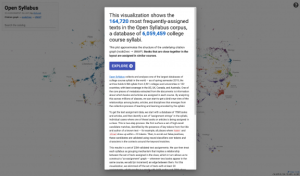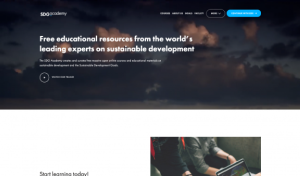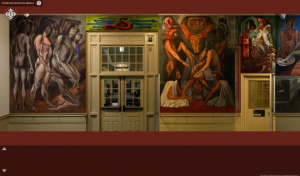General Interest
Back to Top
|
 |
|
Open Syllabus Project: Co-Assignment Galaxy
|
Social studies |
|
The Open Syllabus Project (featured in the 7-15-2016 Scout Report) uses machine learning to analyze "a corpus of seven million English-language syllabi from over 80 countries." At the link above, readers will find the project's Co-Assignment Galaxy, a fascinating interactive visualization of more than 160,000 of the most commonly assigned texts in the Open Syllabus database. Upon arrival, visitors first see a concise yet detailed explanation of what the visualization shows and how it was created. The visualization itself is an intriguing, multicolored concoction that is well worth exploring. Each dot represents a text, with the more popular texts represented by larger dots. These are positioned such that "books that are close together in the layout are assigned in similar courses." Clicking a dot brings up a link to the text's profile page, where users can see more details like which other texts are frequently assigned alongside the selected item. A search bar in the upper left of the Galaxy enables readers to look for a particular title. Launched in 2016 and currently in its second database iteration, the Open Syllabus Project is directed by Joe Karaganis, who is also the vice president of the American Assembly, an independent nonprofit located at Columbia University. [JDC] |
|





|
|
 |
|
SDG Academy
|
Social studies |
|
Readers interested in learning about sustainable development may want to check out these free graduate-level MOOCs (Massive Online Open Courses) offered by SDG Academy, a program from the United Nations' Sustainable Development Solutions Network. These interactive online courses are designed to "cover the headline issues and a multitude of interdisciplinary topics related to the 17 Sustainable Development Goals, a set of aims and targets adopted by member states of the United Nations in 2015," with each course aligning with one or more of these goals. For example, the course entitled "Macroeconomics for a Sustainable Planet" adheres to Goal 8: Decent Work and Economic Growth, while the introductory course "The Age of Sustainable Development" is relevant to all 17 goals. The instructors for SDG Academy's courses are experts drawn from universities, institutes, and organizations around the world, such as New York University, the University of Oxford, and the Stockholm Resilience Centre. Most of the courses are self-paced and can be completed anytime, while some are instructor-paced and have specific start and end dates. All of SDG Academy's courses can be accessed and completed for free via the edX platform, and learners also have the option to purchase certificates verifying course completion. [JDC] |
|





|
|
 |
|
 |
|
e-codices: Virtual Manuscript Library of Switzerland
|
Social studies |
|
For those with an interest in medieval manuscripts, the digital library e-codices will be a welcome boon. First launched in 2005, e-codices bills itself as the "Virtual Manuscript Library of Switzerland" and provides visitors with "free online access to medieval and early modern manuscripts from public and church-owned collections as well as from numerous private collections." Here, visitors will find more than 2,200 digitized manuscripts, totaling more than 800,000 pages, from approximately 100 participating libraries and collections. Several collections are highlighted on the main page, and the Browse & Search section allows visitors to filter the e-codices collections by numerous fields, such as the text language, document type, and whether it is illuminated. While few of the manuscripts were originally written in English, all static pages and basic metadata on the e-codices website are available in English, as well as German, French, and Italian. The e-codices project was founded by its director Christoph Flueler, a professor of Manuscript Studies and Medieval Latin at the University of Fribourg. Since 2013, e-codices has been part of the initiative "Scientific information: Access, processing and safeguarding," which is a national program of swissuniversities, the umbrella organization for universities in Switzerland. [JDC] |
|





|
|
 |
|
Sponsoring Consortium for Open Access Publishing in Particle Physics (SCOAP3)
|
Science |
|
Researchers, students, readers with an interest in particle physics, and librarians may appreciate the work of the Sponsoring Consortium for Open Access Publishing in Particle Physics, or SCOAP3 for short. Describing itself as "a one-of-its-kind partnership of over 3,000 libraries, key funding agencies and research centers in 44 countries and 3 intergovernmental organizations," SCOAP3 works with leading publishers like Elsevier and Springer to convert academic journals in the field of high energy physics to an open access model with no publication fees for authors. Since its launch in January 2014, SCOAP3 has funded more than 30,000 articles, with more than 5,000 articles funded in 2019 as of this write-up. Currently, there are 11 journals participating in SCOAP3, including Nuclear Physics B, Physical Review Letters, and Progress of Theoretical and Experimental Physics. Those interested in reading open-access articles from these and other journals can find them in the SCOAP3 Repository, while those interested in learning more about how SCOAP3 works will find helpful explanations in the FAQ section as well as several recorded webinars in the Resources section. [JDC] |
|





|
|

















